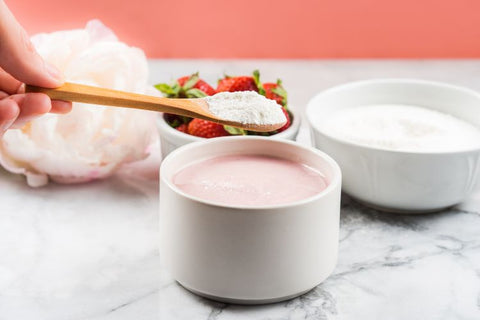You can mix collagen powder with whey protein. Both are generally considered safe for consumption, and there is no inherent danger in combining them. Doing so might offer some potential benefits. Let’s discuss it.
The human body requires essential amino acids for various functions, including building and repairing tissues.
These essential amino acids cannot be synthesized by the body and must be obtained through diet. However, the body utilizes these amino acids more efficiently when they are consumed together in specific ratios. This phenomenon is called amino acid synergy. This article explores the concept of protein sources and their impact on our health. It focuses on two popular choices: whey protein and collagen.
Combining Collagen Powder and Whey Protein
Collagen powder and whey protein are popular supplements, each offering unique benefits:
-
Collagen Powder: Rich in glycine, proline, and hydroxyproline, supporting skin, bone, and joint health. It is considered incomplete as it lacks all essential amino acids.
-
Whey Protein: A complete protein containing all nine essential amino acids, supporting muscle growth and repair.
Combining these supplements could potentially leverage amino acid synergy because Whey protein provides the missing essential amino acids in collagen powder, potentially enhancing its utilization and the combined effects of collagen and whey protein offer broader health benefits beyond their benefits.
Comprehensive Protein Source
Protein, the building block of life, plays a crucial role in various bodily functions, including muscle growth and repair, tissue maintenance, and enzyme production. When choosing protein sources, understanding their amino acid composition is essential, as different proteins offer unique benefits based on their specific amino acid profiles. This section delves into two popular protein sources, whey protein, and collagen, highlighting their strengths and potential synergies.
Whey Protein: A Complete Powerhouse
- Complete Protein: Whey protein, derived from milk, is considered a complete protein. This means it contains all nine essential amino acids that the body cannot synthesize on its own and must obtain from the diet. These essential amino acids are crucial for various functions, including:
- Muscle growth and repair: Specifically, whey protein is rich in branched-chain amino acids (BCAAs), including leucine, isoleucine, and valine. These BCAAs play a vital role in stimulating muscle protein synthesis and promoting muscle growth and repair.
- Improved athletic performance: Studies suggest that whey protein supplementation can enhance exercise performance and recovery by reducing muscle fatigue and soreness.
- Increased satiety: Protein, including whey protein, can contribute to feelings of fullness and may help with weight management by reducing overall calorie intake.
Collagen: The Versatile Scaffold
- Unique Amino Acid Profile: Unlike whey protein, collagen is not a complete protein. However, it boasts a unique amino acid profile rich in glycine, proline, and hydroxyproline. These amino acids play specific roles in the body, including:
- Skin health: Glycine and proline are essential building blocks for collagen, which provides structure and support to the skin, contributing to its elasticity and youthful appearance.
- Joint health: Collagen is a major component of cartilage, the tissue that cushions and protects joints. Adequate collagen levels can help maintain joint health and flexibility.
- Wound healing: Collagen plays a vital role in forming new skin tissue during wound healing.
Exploring Potential Synergies
While whey protein and collagen offer distinct benefits due to their unique amino acid profiles, the notion of amino acid synergy suggests potential advantages of combining them:
- Complementary Profiles: Whey protein complements collagen by providing the missing essential amino acids, potentially enhancing the overall utilization of both protein sources.
- Broader Benefits: Combining these protein sources might offer broader health benefits beyond their advantages. For instance, such a combination might support both muscle health and joint health, catering to individuals with diverse goals.
Muscle Protein Synthesis
Imagine your muscles are like a house. To build a strong house, you need two things: good building materials and a signal to start building.
- Whey protein acts like a box of complete building materials – it has all the essential ingredients your muscles need to grow and repair themselves. One of these materials, called leucine, is like a special foreman telling the crew to get to work.
- Collagen is a different kind of material. While it doesn't have all the building blocks, it provides a strong framework for your muscles. Think of it like the beams and supports that hold the house together. Some research suggests that collagen might even help the foreman (leucine) do his job better, potentially leading to a bigger and stronger house (muscles).
So, can you combine them?
Absolutely! Mixing whey protein and collagen powder might give your muscles both the complete building materials and a potential boost to get them building. This could be especially helpful if you're trying to gain muscle or recover from an injury.
Joint and Tendon Support
Your joints and tendons are like the hinges and wires holding your body together. To keep them moving smoothly, you need strong building blocks and support for those parts. This is where collagen and whey come in.
- Collagen is like the body's own superglue for your joints. It forms the cushiony pads in your joints (cartilage) and helps keep tendons and ligaments strong. As we age, our body makes less collagen, which can lead to aches and pains. Taking collagen supplements might help by providing those building blocks to keep your joints happy.
- Whey protein is great for building and repairing muscles. Strong muscles help support your joints and take pressure off them. Whey protein might also have benefits for tendon health, potentially reducing inflammation and pain.
Can you take both?
Sure! They work in different ways: collagen directly targets your joints, while whey protein indirectly supports them through muscles and potentially tendons. This combo might be especially helpful if you're active, have joint pain, or want to prevent future problems.
Enhanced Texture
Unflavored collagen powder is generally tasteless or has a very mild neutral flavor. However, some individuals might find it has a slightly earthy or chalky aftertaste. Additionally, the texture can be slightly gritty when mixed with liquids.
Whey Protein to the Rescue
Whey protein powder comes in a variety of flavors, ranging from chocolate and vanilla to fruity options. By combining collagen with whey protein in shakes or smoothies, you can:
- Mask the subtle taste of collagen: The stronger flavors of whey protein effectively mask any potential aftertaste from collagen, creating a more enjoyable drinking experience.
- Enhance the overall taste: Combining whey protein with collagen allows you to enjoy the desired flavor of your chosen whey protein, making your protein shake or smoothie more appealing and palatable.
- Improve the mouthfeel: Whey protein powder often has a creamier texture compared to collagen. Blending them can create a smoother and more pleasant mouthfeel in your drink.
Here's how to enjoy the benefits of collagen without compromising taste:
- Choose your favorite flavored whey protein powder.
- Mix your desired amount of collagen powder with the whey protein.
- Add your preferred additional ingredients like fruits, vegetables, milk, or water.
- Blend everything thoroughly.
By following these simple steps, you can create a delicious and nutritious protein shake or smoothie that provides the benefits of both collagen and whey protein, while masking any undesirable taste or texture from the collagen.
Improved Skin Health
Collagen and whey protein are popular supplements, each offering unique benefits for different aspects of health. This section explores their contributions and the potential advantages of combining them.
Imagine your skin is like a bouncy mattress. Collagen acts like the springs, giving your skin its bounce and keeping it plump. As you age, your body makes less collagen, leading to wrinkles and dryness. Collagen supplements might help by providing those building blocks to keep your skin youthful.
Whey Powder on the other hand helps build and repair muscle. Strong muscles give your body a toned look, which indirectly benefits your skin's appearance.
While they target different things (collagen for skin, whey protein for muscle), taking both might offer some advantages:
- One-Stop Shop: Address both muscle and skin concerns with a single combo.
- Double the Power: Whey protein might enhance the effects of collagen, potentially giving you more bang for your buck.
Balanced Nutrient Intake
While protein is often associated with muscle building, its role extends far beyond. Protein is made up of amino acids, the essential building blocks for various bodily functions. Having a balanced amino acid intake is crucial for:
- Enzyme production: Enzymes are vital for countless metabolic processes, and many are made from amino acids.
- Immune function: Certain amino acids play a role in immune system function, supporting the body's defense system against pathogens.
- Hormone production: Specific hormones, like growth hormone and insulin, require amino acids for their synthesis, regulating various growth and metabolic processes.
- Tissue repair and maintenance: All tissues in the body, including skin, organs, and blood, rely on amino acids for repair and maintenance.
Whey protein provides the missing essential amino acids in collagen, potentially enhancing the overall amino acid profile and its potential benefits.
Digestibility
Digestive health is crucial for overall well-being, and some protein sources can be more easily processed by the body than others. Here's how whey protein and collagen differ in terms of digestion, and how combining them might offer potential benefits:
Whey Protein: The Speedy Supply
- Fast Absorption: Whey protein is known for its rapid absorption rate. This means your body can quickly utilize its amino acids for various functions.
- Potential Discomfort: While beneficial for muscle building due to its speedy delivery, this rapid absorption can sometimes lead to digestive discomfort like bloating or gas in individuals with sensitive stomachs.
Collagen: The Gentle Giant
- Easy Digestion: Collagen is generally considered easy to digest and is unlikely to cause significant digestive issues even in individuals with sensitive stomachs.
- Slower Absorption: Collagen is typically absorbed slower than whey protein, which might be beneficial for those seeking sustained protein intake throughout the day.
Versatility in Use
Collagen and whey protein, while commonly used in shakes, offer surprising versatility and can be incorporated into various recipes, adding a nutritional boost without sacrificing taste. Here's how this dynamic duo can add flavor and flexibility to your diet:
Beyond the Blender
- Baked Goods: Elevate your muffins, pancakes, or even bread by adding a scoop of your collagen and whey protein blend to the batter. This adds protein and moisture, making your baked goods fluffier and more filling.
- Energy Bites: Combine your protein blend with nut butter, oats, dried fruits, and other healthy ingredients to create delicious and nutritious energy bites, perfect for a quick on-the-go snack.
- Smoothies and Soups: Enhance the protein content and creaminess of your favorite smoothies or soups by blending in a scoop of your protein blend.
- Yogurt Bowls: Boost the protein content and add a unique texture to your yogurt bowls by sprinkling your protein blend on top, along with fruits, nuts, and granola.
- Sauces and Dips: Add a protein boost to your favorite sauces and dips by incorporating a small amount of your protein blend while blending or mixing.
Meeting Individual Needs
The beauty of this blend lies in its flexibility. You can:
- Adjust the ratio: Experiment with different ratios of collagen and whey protein to find the taste and texture that suit your preference.
- Choose your flavors: Opt for flavored whey protein powders to create delicious and exciting variations in your recipes.
- Cater to dietary needs: Look for collagen and whey protein options that align with your dietary restrictions, such as vegan, soy-free, or gluten-free varieties.
Post-Exercise Recovery
Consuming a combination of collagen and whey protein post-exercise may support faster recovery by addressing both muscle repair and the structural integrity of connective tissues.
Let’s break it down.
After a workout, your muscles are a bit broken down and your joints might feel achy. That's normal! But to get stronger and bounce back faster, your body needs the right tools to repair itself. Here's where collagen and whey protein come in:
Whey Protein: Imagine your muscles are like a house after an earthquake. Whey protein is like a box of building supplies – it has all the essential materials your muscles need to repair and rebuild themselves, making them stronger.
Collagen: Think of your joints as the foundation of the house. Collagen, the main building block of cartilage and tendons, helps keep that foundation strong and stable. Exercise can put stress on those areas, and collagen provides the materials they need to repair any wear and tear.
Some people take both collagen and whey protein after workouts. Here's the potential benefit:
- You get the muscle-repair power of whey protein and the joint-supporting benefits of collagen, all in one go.
Let's sum it up
Collagen and whey protein, while offering distinct benefits, might work together like teammates to support your overall health. Collagen promotes youthful skin and joint health, while whey protein builds strong muscles and potentially improves skin appearance. Combining them might offer a one-stop shop for both muscle and skin health, potentially with broader benefits, but always consult a healthcare professional to find the right approach for you. Remember, a healthy lifestyle with balanced nutrition, exercise, and sleep is key, not just supplements. Consider this dynamic duo if you're looking for a convenient way to boost your protein intake and support various aspects of your well-being, but prioritize professional guidance and a holistic approach to reach your health goals.





